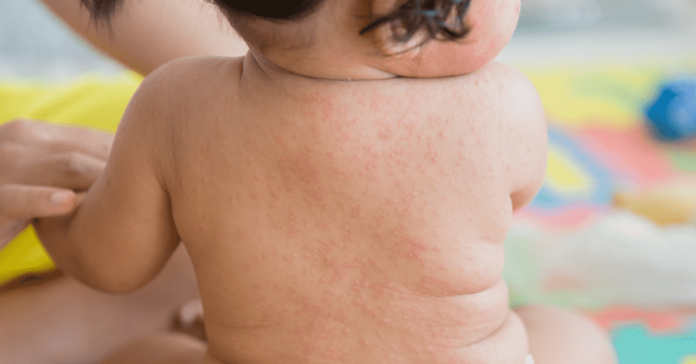Overview
Roseola is a contagious viral infection commonly seen in infants and toddlers. Usually, this infection is not severe and resolves on its own. This article may help you learn more about the symptoms, causes, treatment, and much more.
About the topic
Roseola is a contagious illness caused by some types of herpes viruses. It commonly affects children between the ages of six months to two years. Typically, roseola resolves on its own with the help of medications and rest.
What are the Common Symptoms Seen in Roseola Infection?
If your kid gets exposed to the infection, it could take five to fifteen days for the symptoms to appear. Your child can also be asymptomatic despite being affected by the virus. Moreover, some children might suffer from symptoms mild enough to get unnoticed. Roseola symptoms commonly include:
- High fever– If your child’s temperature goes above 39.5 ℃, then it’s considered a high fever. The fever typically lasts three to seven days.
- Rash – A pink rash develops within 12 to 24 hours after the fever goes away. It might be flat or raised. This pink rash is a characteristic sign of roseola and indicates the end of the infection’s course. There can be a white ring around some of the spots. Usually, the rash starts on the back, chest and abdomen, and and later spreads to arms and the neck. It may or may not reach your legs and face. Sometimes there may not be any rash.
Other signs and symptoms of roseola in a child are:
- Irritability
- Ear pain
- Decreased appetite
- Swollen glands
- Mild diarrhea
- Mild cough or sore throat
- Eyelid swelling
- Convulsions due to high fever
When to See a Doctor?
Roseola can usually be treated at home through over-the-counter medications and rest. However, if you need to seek medical care, you can request an appointment at Apollo Hospitals. Consult your doctor if your child displays these symptoms-
- Febrile seizure- If your child shows signs of seizures due to a high fever, then seek medical care immediately.
- Your child has a persistent high fever that lasts for more than seven days
- If you don’t observe any improvement in the spread of rashes.
Call 1860-500-1066 to book an appointment
How To Prevent Roseola Infection?
There is no vaccine to prevent roseola infection. Avoid exposure to an infected person to ensure the safety of your child. Furthermore, if your child is sick, keep them away from other children until the virus has run its course.
If you have an infected person at home, then make sure to wash your hands repeatedly to avoid the spread of infection.
What are the Common Causes of Roseola?
Most often, roseola is caused by exposure to the human herpesvirus type 6. Sometimes the virus in human herpes virus 7 as well.
Like other viral infections, roseola spreads through tiny droplets of fluid. Most commonly, this occurs when an infected person coughs, talks or sneezes. If a healthy child shares objects with an infected child, they can contract the virus.
Roseola is contagious even if there are no signs of a rash. That means the illness can spread even when an infected child has just a fever. The disease can occur at any time of the year but rarely results in a community outbreak.
What are the Remedies for Roseola?
There is no specific treatment for roseola. Medications like antibiotics or antifungals cannot treat this viral infection. Your doctor might prescribe your over-the-counter medicines to treat the symptoms of roseola. We have listed a few tips that can help your child recover from roseola:
- Your doctor might prescribe medicines like acetaminophen or ibuprofen to help lower the fever and reduce pain.
- Do not give your child aspirin during a viral illness, as its use has been linked to Reye syndrome.
- Ensure that your child is adequately hydrated and intakes extra fluid during the disease.
- Keep your child comfortable by dressing them in loose and airy clothes.
Call your physician if your child shows signs of lethargy or seizures.
Conclusion
Roseola is a self-limiting viral disease that typically resolves . Most kids develop antibodies by the time they reach school age, making them immune to repeat infection. Usually, you can treat the illness at home through OTC medications. However, you can call 1860-500-1066 to book an appointment if there is no improvement in your child’s symptoms.
Frequently Asked Questions (FAQs)
- Can adults contract roseola?
Yes, adults can contract roseola. However, adults usually experience milder symptoms than children.
- What’s the incubation period of roseola?
The incubation period is the duration from first exposure to the virus till the time symptoms appear. Roseola has an incubation period of about 14 days.
- How is roseola diagnosed?
Doctors typically consider the medical history of your child. They might also recommend some tests to check the saliva of your child.
- How soon will my child feel okay?
Children will often feel better after the appearance of the rash. Your child can return to normal activities 24 hours after the symptoms go away.


















